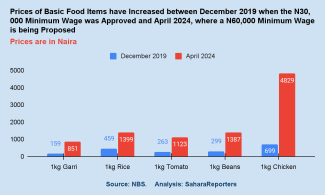
This followed negotiations between the Nigerian government and labour unions.
In December 2019, it was widely reported that the Nigerian government had approved a minimum wage of N30,000.
This followed negotiations between the Nigerian government and labour unions.
About five years down the line, there is a dispute between organised labour and the federal government.
While there has been a back and forth on the need to have a new minimum wage, given the economic realities of the country, the exact amount to be pegged as the new minimum wage has been a subject of disagreement between workers in the private, public sector on the one hand and the Nigerian governmentand private sector decision-makers on the other hand.
As of the time of filing this report, the Nigerian government’s proposal of N60,000 minimum wage was on the table, but it has been rejected by labour unions.
As a sign of discontent, the workers in the country have downed tools. The Nigeria Labour Congress President, Joe Ajaero and Trade Union Congress President, Festus Osifo, accused the government of being unserious with the negotiations, “leaving the labour with no choice but to initiate industrial action”.
Power and aviation are some of the sectors that have been grounded.
In this report, SaharaReporters delves into this disagreement, examining the proposed N60,000 minimum wage and the current N30,000 minimum wage. The report looks at what can N60,000 buy in current-day Nigeria and what could N30,000 do as of 2019 when it was approved as the new minimum wage.
Between December 2019, when the new minimum wage was widely reported and April 2024, the prices of basic food items have increased by well over 200%, increasing by over 500% in some cases.
As of December 2019, 1kg of garri cost N159, however, it had jumped to N851 as of April2024.
A kilogramme of rice sold for N459 in December 2019, but the same quantity sold for a national average of N1,399 in April 2024, based on data from the National Bureau of Statistics.
Other items such as tomatoes, beans and chicken have witnessed significant hikes in prices.
N30,000 Minimum Wage In 2019 Worth More N60,000 Minimum Wage Proposed In 2024
Based on data from the National Bureau of Statistics, foodwise, N60,000 is currently worth less compared to the N30,000 approved minimum wage of N2019.
Data analysis shows that in December 2019, N30,000 could purchase 188kg of garri but N60,000 as of April 2024, could only purchase 70kg of garri.
N30,000 as of 2019 could purchase 65kg of rice but N60,000 in April 2024, would only purchase 42kg of rice.
N30,000 in 2019 would buy 100kg of beans, however, N60,000 in April 2024 could only buy 43kg of beans. The proposed N60,000 is only worth 12 kg of chicken while N30,000 was worth N42kg of chicken as of 2019, based on data published by the National Bureau of Statistics.
N30,000 Worth More In Dollars In 2019 Than N60,000 In 2024
Nigeria is a highly import-dependent country, usually affected largely by the impact of the dollar to naira rate, especially as the dollar is a globally accepted trading currency.
The exchange rate of dollar to naira as of December 2019 was N359, meaning that N30,000 minimum wage was worth $83, per official exchange published by the CBN.
But as of May 31, 2024, the dollar stood at N1,482 to naira, meaning that N60,000 is worth $40.
N30,000 Can Cover More Road Trips Than Newly Proposed N60,000 Minimum Wage
SaharaReporters review shows that the average cost for road trips in December 2019, stood at N198, meaning that N30,000 couldcover 151 road trips, based on data on the cost of road transport provided by the National Bureau of Statistics.
As of April 2024, the average cost of a road trip stood at N967, meaning that N60,000 could cover only 62 road trips at the time.
N30,000 In 2019 Would Buy More Litres OfFuel Than N60,000 Today
Petroleum is a major item in the Nigerian economy. Many rely on it for electricity, given the poor state of power supply in the country. Others rely on it for transportation.
Petrol is a major lifeline, but it cost more in April 2024, than it did in December 2019.
N30,000 could purchase 206 litres of fuel at N145 per litre in 2019, while the currently proposed N60,000 can only buy 85 litres of fuel.
The ongoing strike action embarked upon by organised labour on Monday has paralysedactivities in the country amid sprawling inflation and hunger being experienced by citizens. The Nigerian government has defended its proposal of N60,000, but the Nigerian labour has waved off the argument, calling it “unserious”.